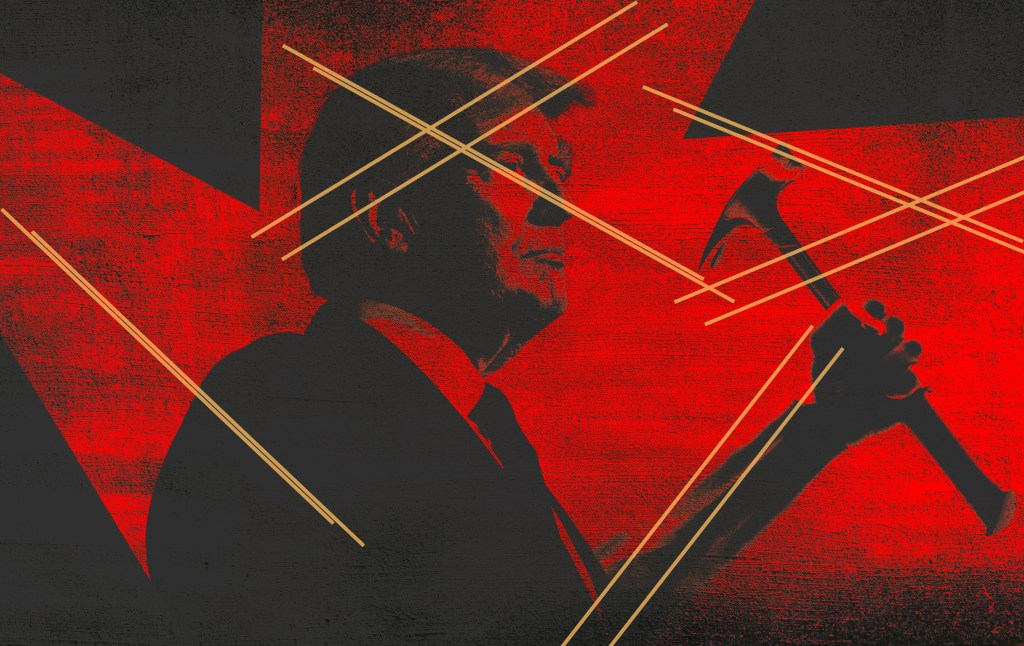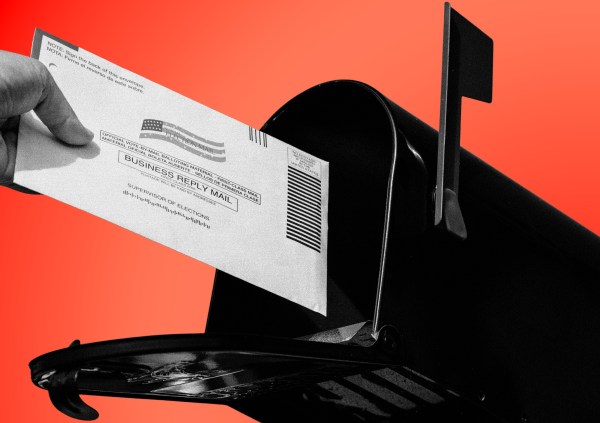The House Freedom Caucus has been a laughingstock for years, snarling and yelping about smaller government yet unfailingly rolling over on command to let Donald Trump pet its belly. It reflects in miniature the devolution of the American right from guardians of liberty against authoritarianism to guardians of authoritarianism against liberty.
So when its most prominent member, Texas Rep. Chip Roy, announced last week that he’ll quit Congress to seek office at the state level, it felt welcome and overdue. Like so many legacy institutions held over from the right’s pre-Trump era, the Freedom Caucus had become worse than useless by giving conservative voters ideological cover to stick with a party that’s wrecking everything they claimed to stand for. If Reaganites intend to acquiesce in the total destruction of Reaganism (spoiler: they do), they should be made to do so honestly, without the benefit of a fig leaf to ease their shame.
As if to underline the point, some 24 hours or so after Roy finally abandoned the sinking S.S. Gipper, our Republican president announced that he had … seized the means of production.
As a non-paying reader, you are receiving a truncated version of Boiling Frogs. You can read Nick’s full newsletter by becoming a member here.
“It is my Great Honor to report that the United States of America now fully owns and controls 10% of INTEL, a Great American Company that has an even more incredible future,” he declared on Friday afternoon. That makes four businesses that his administration has taken a financial interest in, with lots more to come. “I’m sure at some point there’ll be more transactions, if not in this industry than other industries,” said smirking pretend-conservative Kevin Hassett, one of Trump’s economic advisers and the frontrunner to replace Jerome Powell as Federal Reserve chair.
Hassett wasn’t speculating. According to the New York Times, the White House isn’t opportunistically squeezing companies that happen to have business pending with the executive branch. It’s scouting for corporations to extort: “The Trump administration is casting a wide net, scouring other companies that it thinks could be ripe for some form of government involvement, three people briefed on these discussions said.”
Nor are all of its targets distressed and desperate for a federal backstop to stay afloat, like U.S. automakers were when the Obama administration took interests in their companies. Nvidia, for instance, is doing just fine. “Virtually every company I’ve talked to which is a regular recipient of subsidies or grants from the government is concerned about this right now,” a corporate defense attorney told the Times of Trump’s latest shakedown. The Intel deal isn’t an exception to how businesses that receive taxpayer funds will be treated, as the automaker case was years ago. Going forward, it’s likely to be the rule.
They told me that if I voted for Kamala Harris we’d end up with a command-and-control economy. And they were right.
“Is Trump a socialist?” Vox asked after news of the Intel deal broke. Not exactly. What he’s practicing is what I’d call socialism without socialism.
Command and control.
The president is enough of a socialist to have received a round of applause for his Intel deal from America’s most prominent pinko, Sen. Bernie Sanders.
And he’s enough of a socialist to have roused normally docile conservatives to condemn the Intel news harshly, including a few Reaganite economists who long ago made their peace with Trumpism in other respects. “I hate corporate welfare. That’s privatization in reverse. We want the government to divest of assets, not buy assets,” said Stephen Moore, whom the president once nominated for a seat at the Fed, on Fox Business. “I am very, very uncomfortable with that idea,” host Larry Kudlow agreed—before quickly moving on.
The Intel squeeze is socialist-ist, if that makes sense. But it’s not socialist.
Socialism is an economic theory that prioritizes wealth equality over wealth creation. It calls for the state to control the means of production on behalf of the great working-stiff majority, to ensure that they receive more of the fruits of their labor than rapacious private owners would be willing to share under capitalism.
Putting the state in charge of industry leads to all sorts of funny quirks. Markets grow distorted and inefficient as the government intervenes, slowing growth and producing shortages. The rapacious bourgeoisie gives way to a more rapacious class of racketeering bureaucrats eager to use their new power to enrich their friends and punish their enemies. Government coercion, up to and including mass violence, replaces the profit motive as the primary tool for inducing behavior.
It’s a real peach. And socialism’s theory of how to achieve the greatest good, by devolving wealth from the top of society to the desperate bottom, usually ends up producing greater desperation across all classes rather than greater prosperity. (That’s equality of a sort.) But it does at least have a theory of civic virtue behind it. It’s possible to be a well-meaning socialist, especially if you don’t know a thing about the history of socialism.
There’s no similarly altruistic “theory” behind what Trump is doing with Intel and other companies.
Lord knows, he’s not trying to raise up the proletariat. This is the same guy who just slashed Medicaid for millions and extended a slate of tax cuts under which the very rich, not the poor, stand to make out like bandits.
There’s no obvious benefit either to working joes that I can see from the feds acquiring a stake in Intel. Whatever money the government makes off of its interest in the company will be meaningless relative to the annual debt we’re incurring, which now stands to be considerably larger than it did on January 20 thanks to the president and his party. And as our own Scott Lincicome explained in teeth-gnashing detail, having the White House involved in the chips industry will create all sorts of deleterious incentives for stakeholders across society—Intel, its competitors and customers, and the government itself. Americans will suffer for it economically on balance.
The company is now an arm of an administration that’s very keen to throw its weight around. Everyone else in the world will need to relate to it that way from now on, and will. Using government ownership to inject politics directly into business is like mixing dog poop with ice cream: The flavor of what results will be dominated by its most distinctive ingredient.
So when I say that Trump is practicing socialism without socialism, what I mean is that he relishes wielding the command-and-control authority that socialist rulers claim but has no interest in the theory of equality that supposedly justifies it. He wants the president to be the dominant authority in all spheres of American life, with the key players in each sphere compelled to account to him whenever he intervenes—but without any pretense that he’s doing it to help the underclass feed their families.
He wants control for the sake of having control, socialism without socialism. With apologies to Adam Serwer, the intervention is the point.
The intervention is the point.
That would explain why he sought a stake in Intel and is looking at other companies to shake down. He’s not trying to advance some theory of the common good. He’s looking at businesses that receive money from the federal government—thanks to Congress, not to him—and treating it as leverage to demand a degree of control over their operations. Like any natural predator, he’s exploiting a vulnerability to his own advantage.
In a Trump-led America, everyone should answer to the president. And if he gets his way, everyone will.
Case in point: This weekend, in the span of 24 hours, he publicly threatened three individuals or groups that had displeased him. Maryland Gov. Wes Moore complained about Trump demagoguing crime in Baltimore; Trump responded by wondering if he should “rethink” funding for Baltimore’s collapsed Francis Scott Key Bridge. Former New Jersey Gov. Chris Christie criticized him in an interview on ABC News; the president responded by saying he might restart a criminal probe into Christie over the ancient Bridgegate scandal. Later he groused about unfavorable news coverage on ABC and NBC and wondered why the networks haven’t either lost their broadcast licenses yet or been made to pay millions of dollars to retain the privilege. (If you’re surprised that he omitted CBS, you shouldn’t be.)
Whether the bridge you drive over is repaired, whether the news show you watch stays on the air, whether the Justice Department conducts a fishing expedition into your activities: The president wants control over all of it, and once he has it then you’ll need to do something for him to give him a reason to exert that control benevolently. It’s petty tyranny, undisguised, with no pretense in any of the examples I just gave of improving the lives of any American other than Donald Trump.
The Intel deal itself began with a presidential threat, as a matter of fact, one that was rescinded only once the White House was granted some control over the company. That’s a state protection racket without a common-good rationale—a.k.a. socialism without socialism. Elsewhere recently, Trump’s sleaziest toady at the Justice Department abused his power to try to pressure one of the president’s political nemeses into resigning from office, even going as far as to take a photo of himself outside her home to show his intention to intimidate her. Government coercion of enemies for reasons of pure personal revenge is also socialism without socialism, and we’ve seen quite a lot of it lately.
The longer this goes on without Congress asserting itself to stop him, the less petty and more domineering Trump’s interventions will become. News broke on Saturday, for instance, that he’s planning a new domestic military deployment in Chicago, but on what grounds? The National Guard went to Washington, D.C., because it’s a federal territory and to Los Angeles because riots had begun. But Illinois is a sovereign state and there’s no emergency there, and no law entitles Trump to exert military control over a major metropolis in peacetime. He’s acting under the authority he acts under in most of his most socialist-ist gambits, the Who’s Gonna Stop Me? clause of the Constitution that exists in his mind.
The most you can say of his military shows of force is that, in aiming to fight crime, they do have some nominal common-good logic behind them. But that logic is so thin, from the White House’s total neglect of rampant crime in red states’ blue cities to the questionable offenses now being prosecuted in Washington in order to justify the crackdown there, that it’s impossible to take seriously. More likely is that these too are an expression of his itch to impose his will on cultural and political resisters across the breadth of American life—museums are next!—and he’s using the military to scratch it.
All of which makes me wonder why fiscal conservatives like Larry Kudlow and Stephen Moore seem to find his Intel shakedown so much more galling than everything else he’s done. One should find it galling for the reasons Lincicome lays out. But on the ol’ fascist-o-meter, taking a financial interest in a corporation pegs quite a bit lower than normalizing policing by the military or pardoning violent political henchmen or taking bribes in broad daylight or claiming sweeping power to ignore laws you dislike.
Of all the domineering power plays Trump has made to disrupt America’s civic order, the red line for Reaganites is … Intel?
The red line.
It makes sense, actually. The depressing answer is that most conservatives (or “conservatives,” I should say) don’t mind statism, they mind left-statism.
They’ll happily tolerate Trump using government power to throttle their leftist enemies. But the Intel shakedown doesn’t map neatly onto the usual left-right culture-war politics—and insofar as it does, it’s a lot more redolent of left-statism than right-statism. When the government seizes chunks of productive industry, even the desiccated consciences of Trump-assimilated Reaganites will stir.
“I always thought that the Republican Party was the one who always talked about … ‘Let’s get big government out of our lives,’” Wes Moore told MSNBC on Monday. “And we have never seen such an [overreach] of big government like we are seeing with the Trump administration.” That’s correct, and every commentator who spent eight years complaining in apocalyptic terms about it under Barack Obama yet remains aligned with the right today looks like a colossal chump because of it. Kudlow, Stephen Moore, and the rest have just enough shame left to do a bit of discomfited throat-clearing when Trump reminds them in a glaring way how much they’ve sacrificed intellectually to remain on the team.
Their humiliation won’t end here, though. The biggest bogeyman in right-wing politics at the moment (and likely for the next 14 months) is New York mayoral frontrunner Zohran Mamdani, and for good reason. How are fiscal conservatives supposed to harrumph about his penny-ante “government grocery stores” scheme with straight faces when the gangster in the White House whom they worship is squeezing American corporations by the throat until they hand over their wallets?
Obama’s record illustrates the point I made earlier about socialism. You can hate the biggest “big government” ventures of his presidency while acknowledging that they did, at least, have some purpose grander than simply accruing power to his office. The 2009 stimulus package was meant to jump-start the economy after the Great Recession; the 2010 Obamacare push was designed to cover health care for people with preexisting conditions by forcing everyone to pay into the insurance system. The interventions had a point.
Under Trump, the intervention is the point. Socialism without socialism: The president is rightly in charge of everything, supposedly, even if there’s no argument that the public will benefit from him being in charge of a particular thing beyond “I trust that whatever Donald Trump wants at any given moment is the right thing for our country.” If that wasn’t already clear from his incoherent tariff policies, it should be now that he’s gone full socialist—or socialist-ist, I should say.
Do American voters understand yet what they’ve unleashed here, or where it will go unless rival power centers in government awaken to show him that the Who’s Gonna Stop Me? clause is not a thing? “It’s still early,” you say. It isn’t. It’s late.











Please note that we at The Dispatch hold ourselves, our work, and our commenters to a higher standard than other places on the internet. We welcome comments that foster genuine debate or discussion—including comments critical of us or our work—but responses that include ad hominem attacks on fellow Dispatch members or are intended to stoke fear and anger may be moderated.
With your membership, you only have the ability to comment on The Morning Dispatch articles. Consider upgrading to join the conversation everywhere.